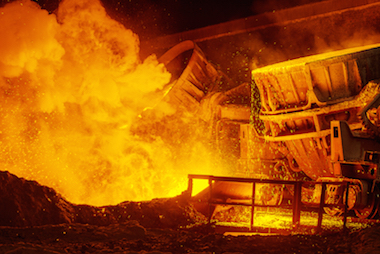Why the British steel industry is in meltdown

As West Midlands-based steel manufacturer Caparo announced its administration, the nation’s spotlight focused on the catastrophic decline of the British steel industry. Insights takes a look at what has gone wrong with an industry that was once a mainstay of the British economy
Jermaine HaughtonOne must only go as far back as the mid-1970s for a taste of Britain’s storied steel industry, located from the Midlands and South Yorkshire to Motherwell, Scotland. But compared to the 200,000+ employees then, today’s British workforce has shrunk to just 30,000. And the latest steel crisis is set to reduce numbers even further.
With more than 1,700 workers set to be affected by the administration of Caparo, a producer of steel tubes and fastenings for the aerospace, automotive and other industries, Britain’s second biggest steelmaker SSI has also closed down its plant in Redcar resulting in 2,200 job losses.
A further 1,200 have also been cut by Tata Steel in Scunthorpe and at two of its manufacturing units in Scotland. This follows around 1,000 jobs being removed from its production sites in Newport, Port Talbot and Rotherham.
“We will be working to support our members within Caparo at this difficult time and are seeking an urgent meeting with the company,” said Roy Rickhuss, general secretary of steelworkers’ union, Community. “This is an industry-wide crisis. It is vitally important that Britain’s steel companies hold their nerve and that government works with unions and the industry to build a sustainable future for UK manufacturing with steel at its heart.”
Affecting all areas of steel manufacturing, British firms have been ravaged by the steel products market being saturated by cheap Chinese imports, slowing demand, the high cost of energy prices and the strengthening of sterling in recent years.
CHINESE EXPORTS FLOOD THE MARKET
Steel manufacturers are lobbying Prime Minister David Cameron and his government to address the Chinese dumping of steel, as the Far East country’s President Xi Jinping visits the UK this week.
As the world’s biggest trader, China produces about half of the 1.6bn tonnes of steel made globally each year, thus playing a major role in dictating its prices. However, when the Chinese economy slowed sharply this year, leaders in Beijing sought to revive their markets by chasing foreign currencies through selling their products, including iron and steel, abroad at a loss.
Experts estimate that the aggressive tactic forced the price of slab steel down by 45% in just 12 months, from $500 (£330) a tonne to about $280. And while Chinese steel exports have been boosted by 53% as a result, steelmakers in the UK (and other competing western nations) have seen a severe decline in sales.
Among a number of recommendations, representatives from the UK steel industry have urged the Government to support a ban on anti-dumping and unfair imports, whereby vendors are selling steel at an unrealistically low price – at which rival firms are unable to compete with.
Business Secretary Sajid Javid, who chaired a summit in Rotherham on Friday to discuss the industry’s future, said: "This is a hugely difficult time for the steel industry across the world - one of the toughest times ever. It is a worldwide problem, and while it will not be solved overnight, we will work closely in partnership with the industry to help find some answers.”
SOARING ENERGY COSTS
In combination with the flooding of cheap Chinese steel, the high electricity costs to heavy manufacturers and energy-intensive businesses in the UK, and the added expense of climate change policies, have put British steelmakers at a disadvantage to its foreign competitors.
Daily Mail commentator Dominic Lawson said that the commitment from the British Government that 15% of all the country’s energy comes from ‘renewable sources” by 2020 has led to Briton’s paying more money to use more expensive energy sources. In 2010 these put UK electricity users at a £15/MWh disadvantage compared to those in Germany – this adds £8 to the cost of a tonne of steel. For products sold at less than £200 a tonne, many businesses are struggling to make a profit.
In a recent statement, trade association and steel manufacturing representative UK Steel said: “As well as battling against falling prices, a rise in unfairly traded steel imports and a persistently strong pound, the sector is being hit by disproportionate policy and business costs, higher than those faced by both global and European competitors. These costs include an additional £130m a year to energy prices by climate change policies that make the UK steel sector’s energy costs up to double those of French and German plants.”
In response, the Government has already provided steel makers with millions of pounds in compensation for carbon permit costs, but it is restricted by European Union state-aid rules to delve any further into its pockets to help the ailing industry. Therefore, steelmakers are lobbying government to rethink its industrial and energy strategy, as higher energy costs are leading to carbon-intensive activity to shift overseas countries with less-demanding environmental regulations, and damaging local economies across the UK.
"We've set out some of the things government can press ahead with now to send out a clear signal of support in the very short term," said UK Steel director Gareth Stace. "At the top of that list is a clear and unambiguous commitment to fully implement the energy intensive industries compensation package, which will go some way to rebalancing the crippling costs of electricity for British steel making firms.”

Press & Media Enquiries
For more information or to request interviews, contact CMI's Press Team on 020 7421 2705 or email press.office@managers.org.uk


